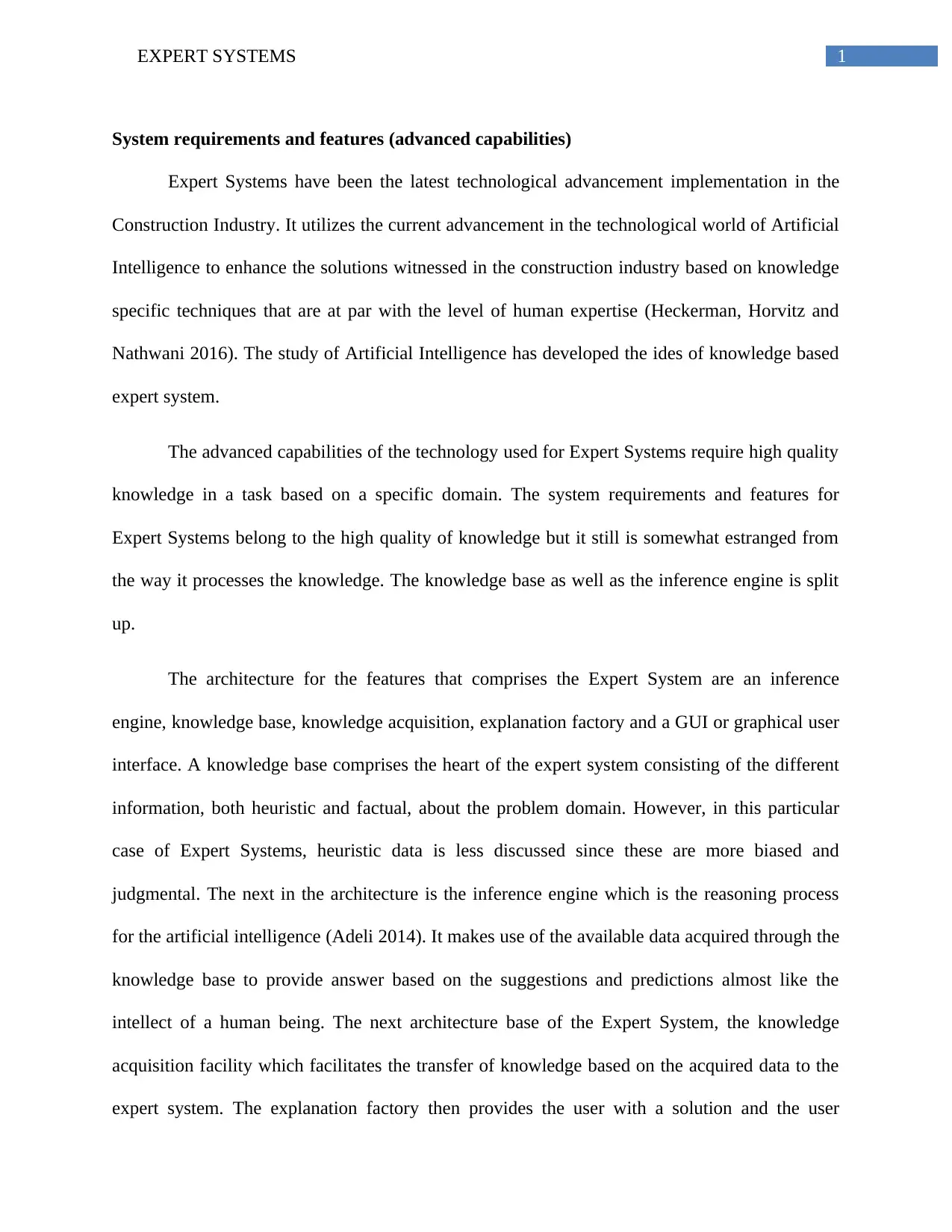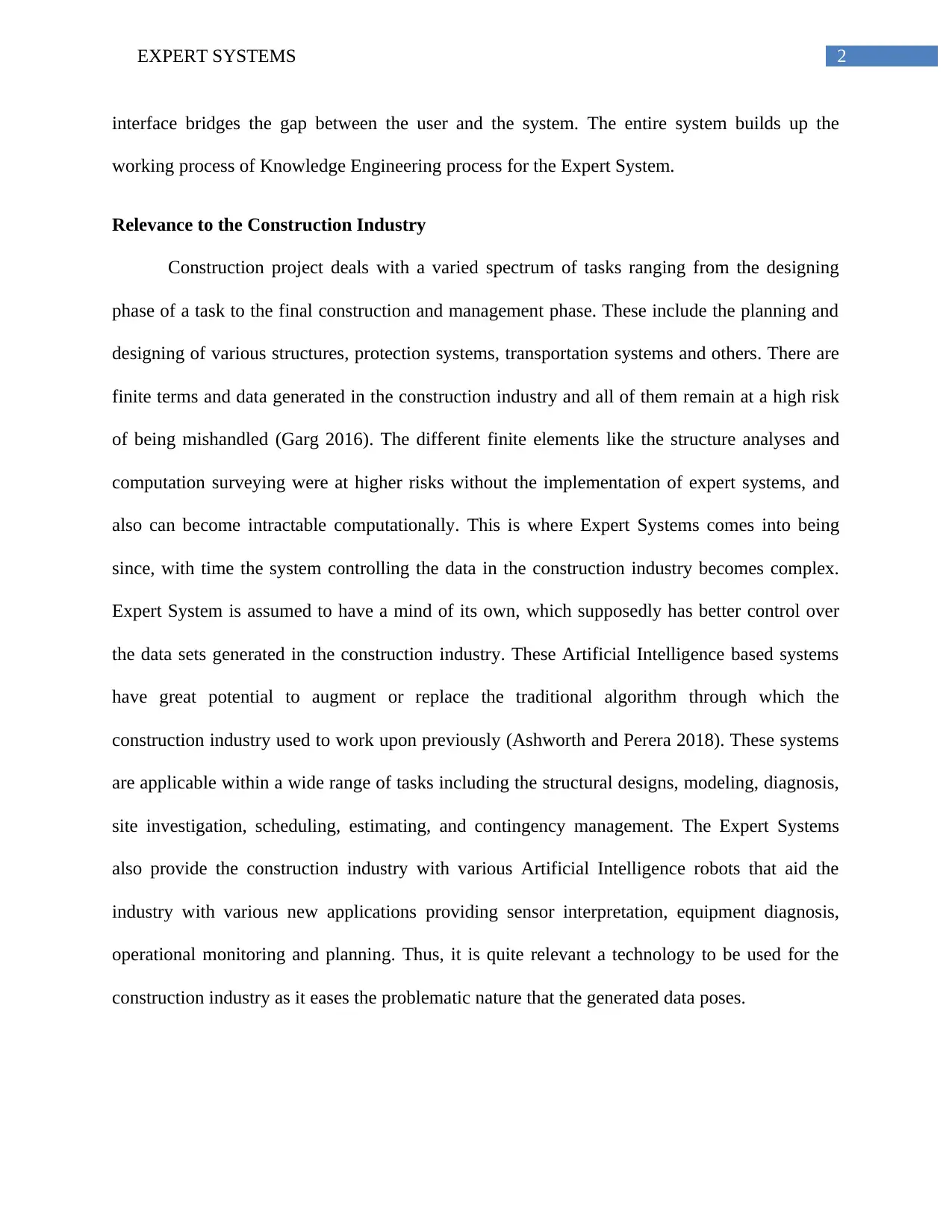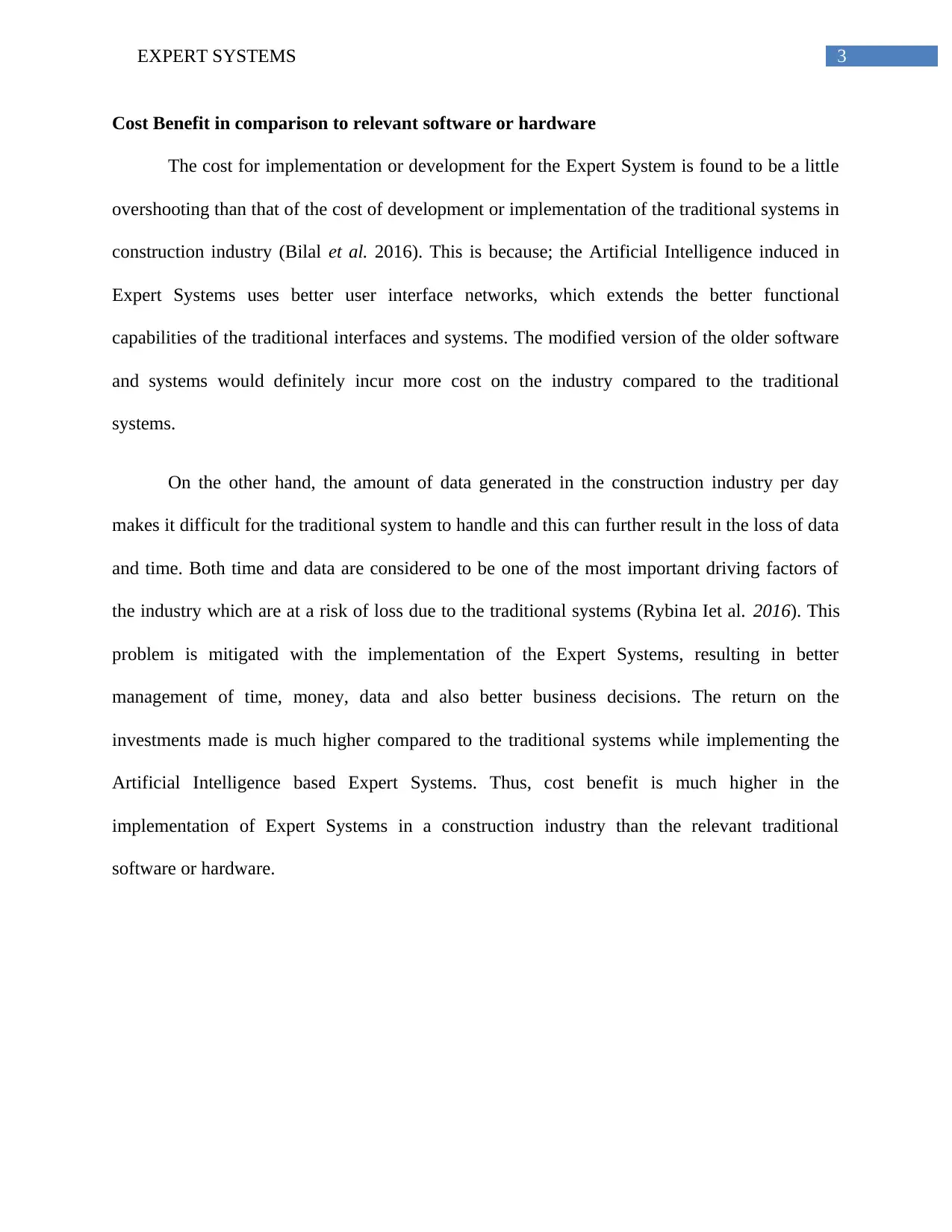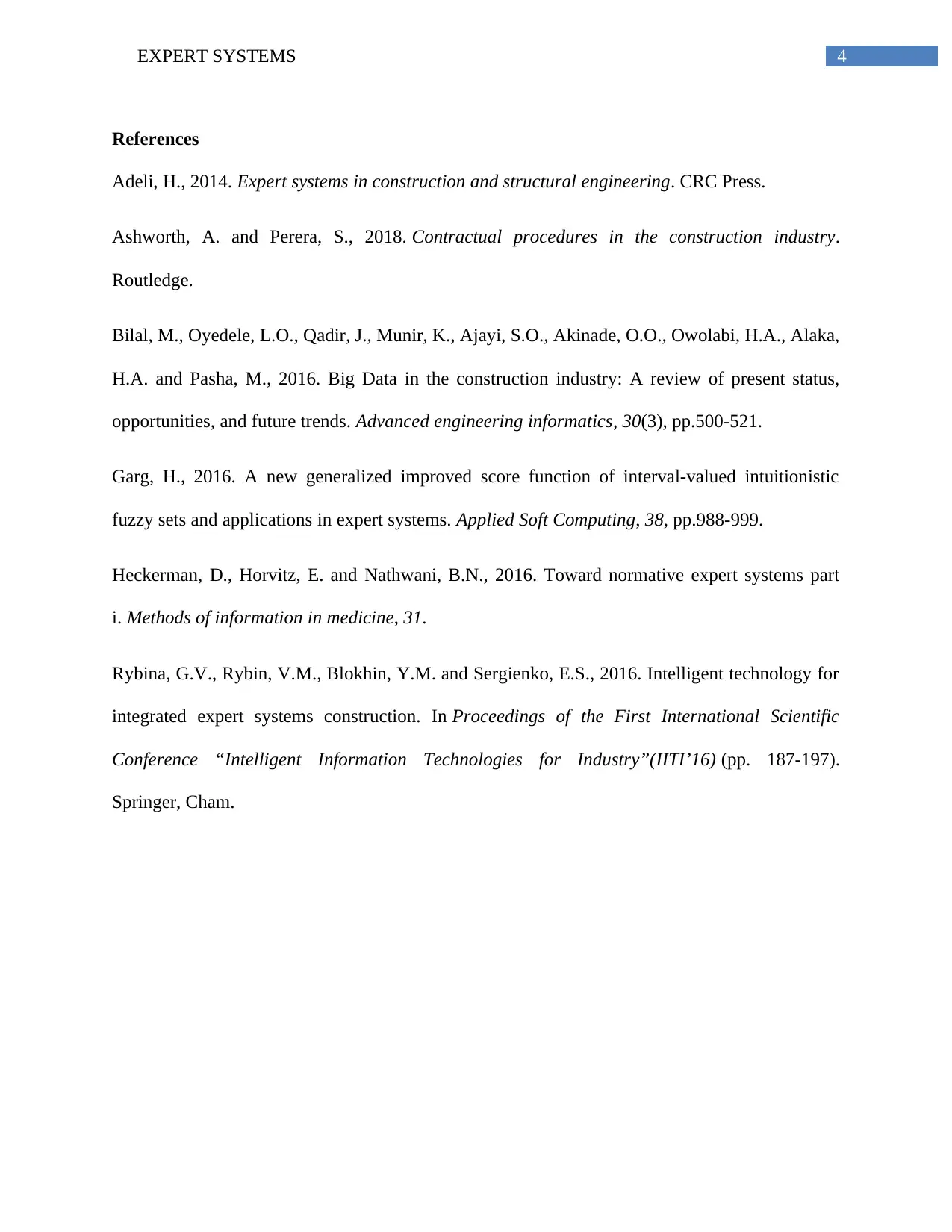Expert Systems in Construction Industry: Requirements, Features, and Relevance
VerifiedAdded on 2023/06/07
|5
|1135
|461
AI Summary
This article discusses the system requirements and features of Expert Systems, which are the latest technological advancements in the construction industry. It also highlights the relevance of Expert Systems in the construction industry and their cost-benefit in comparison to traditional software or hardware. The article cites relevant studies and research to support its claims.
Contribute Materials
Your contribution can guide someone’s learning journey. Share your
documents today.

Running head: EXPERT SYSTEMS
Expert Systems
Name of the Student
Name of the University
Author Note
Expert Systems
Name of the Student
Name of the University
Author Note
Secure Best Marks with AI Grader
Need help grading? Try our AI Grader for instant feedback on your assignments.

1EXPERT SYSTEMS
System requirements and features (advanced capabilities)
Expert Systems have been the latest technological advancement implementation in the
Construction Industry. It utilizes the current advancement in the technological world of Artificial
Intelligence to enhance the solutions witnessed in the construction industry based on knowledge
specific techniques that are at par with the level of human expertise (Heckerman, Horvitz and
Nathwani 2016). The study of Artificial Intelligence has developed the ides of knowledge based
expert system.
The advanced capabilities of the technology used for Expert Systems require high quality
knowledge in a task based on a specific domain. The system requirements and features for
Expert Systems belong to the high quality of knowledge but it still is somewhat estranged from
the way it processes the knowledge. The knowledge base as well as the inference engine is split
up.
The architecture for the features that comprises the Expert System are an inference
engine, knowledge base, knowledge acquisition, explanation factory and a GUI or graphical user
interface. A knowledge base comprises the heart of the expert system consisting of the different
information, both heuristic and factual, about the problem domain. However, in this particular
case of Expert Systems, heuristic data is less discussed since these are more biased and
judgmental. The next in the architecture is the inference engine which is the reasoning process
for the artificial intelligence (Adeli 2014). It makes use of the available data acquired through the
knowledge base to provide answer based on the suggestions and predictions almost like the
intellect of a human being. The next architecture base of the Expert System, the knowledge
acquisition facility which facilitates the transfer of knowledge based on the acquired data to the
expert system. The explanation factory then provides the user with a solution and the user
System requirements and features (advanced capabilities)
Expert Systems have been the latest technological advancement implementation in the
Construction Industry. It utilizes the current advancement in the technological world of Artificial
Intelligence to enhance the solutions witnessed in the construction industry based on knowledge
specific techniques that are at par with the level of human expertise (Heckerman, Horvitz and
Nathwani 2016). The study of Artificial Intelligence has developed the ides of knowledge based
expert system.
The advanced capabilities of the technology used for Expert Systems require high quality
knowledge in a task based on a specific domain. The system requirements and features for
Expert Systems belong to the high quality of knowledge but it still is somewhat estranged from
the way it processes the knowledge. The knowledge base as well as the inference engine is split
up.
The architecture for the features that comprises the Expert System are an inference
engine, knowledge base, knowledge acquisition, explanation factory and a GUI or graphical user
interface. A knowledge base comprises the heart of the expert system consisting of the different
information, both heuristic and factual, about the problem domain. However, in this particular
case of Expert Systems, heuristic data is less discussed since these are more biased and
judgmental. The next in the architecture is the inference engine which is the reasoning process
for the artificial intelligence (Adeli 2014). It makes use of the available data acquired through the
knowledge base to provide answer based on the suggestions and predictions almost like the
intellect of a human being. The next architecture base of the Expert System, the knowledge
acquisition facility which facilitates the transfer of knowledge based on the acquired data to the
expert system. The explanation factory then provides the user with a solution and the user

2EXPERT SYSTEMS
interface bridges the gap between the user and the system. The entire system builds up the
working process of Knowledge Engineering process for the Expert System.
Relevance to the Construction Industry
Construction project deals with a varied spectrum of tasks ranging from the designing
phase of a task to the final construction and management phase. These include the planning and
designing of various structures, protection systems, transportation systems and others. There are
finite terms and data generated in the construction industry and all of them remain at a high risk
of being mishandled (Garg 2016). The different finite elements like the structure analyses and
computation surveying were at higher risks without the implementation of expert systems, and
also can become intractable computationally. This is where Expert Systems comes into being
since, with time the system controlling the data in the construction industry becomes complex.
Expert System is assumed to have a mind of its own, which supposedly has better control over
the data sets generated in the construction industry. These Artificial Intelligence based systems
have great potential to augment or replace the traditional algorithm through which the
construction industry used to work upon previously (Ashworth and Perera 2018). These systems
are applicable within a wide range of tasks including the structural designs, modeling, diagnosis,
site investigation, scheduling, estimating, and contingency management. The Expert Systems
also provide the construction industry with various Artificial Intelligence robots that aid the
industry with various new applications providing sensor interpretation, equipment diagnosis,
operational monitoring and planning. Thus, it is quite relevant a technology to be used for the
construction industry as it eases the problematic nature that the generated data poses.
interface bridges the gap between the user and the system. The entire system builds up the
working process of Knowledge Engineering process for the Expert System.
Relevance to the Construction Industry
Construction project deals with a varied spectrum of tasks ranging from the designing
phase of a task to the final construction and management phase. These include the planning and
designing of various structures, protection systems, transportation systems and others. There are
finite terms and data generated in the construction industry and all of them remain at a high risk
of being mishandled (Garg 2016). The different finite elements like the structure analyses and
computation surveying were at higher risks without the implementation of expert systems, and
also can become intractable computationally. This is where Expert Systems comes into being
since, with time the system controlling the data in the construction industry becomes complex.
Expert System is assumed to have a mind of its own, which supposedly has better control over
the data sets generated in the construction industry. These Artificial Intelligence based systems
have great potential to augment or replace the traditional algorithm through which the
construction industry used to work upon previously (Ashworth and Perera 2018). These systems
are applicable within a wide range of tasks including the structural designs, modeling, diagnosis,
site investigation, scheduling, estimating, and contingency management. The Expert Systems
also provide the construction industry with various Artificial Intelligence robots that aid the
industry with various new applications providing sensor interpretation, equipment diagnosis,
operational monitoring and planning. Thus, it is quite relevant a technology to be used for the
construction industry as it eases the problematic nature that the generated data poses.

3EXPERT SYSTEMS
Cost Benefit in comparison to relevant software or hardware
The cost for implementation or development for the Expert System is found to be a little
overshooting than that of the cost of development or implementation of the traditional systems in
construction industry (Bilal et al. 2016). This is because; the Artificial Intelligence induced in
Expert Systems uses better user interface networks, which extends the better functional
capabilities of the traditional interfaces and systems. The modified version of the older software
and systems would definitely incur more cost on the industry compared to the traditional
systems.
On the other hand, the amount of data generated in the construction industry per day
makes it difficult for the traditional system to handle and this can further result in the loss of data
and time. Both time and data are considered to be one of the most important driving factors of
the industry which are at a risk of loss due to the traditional systems (Rybina Iet al. 2016). This
problem is mitigated with the implementation of the Expert Systems, resulting in better
management of time, money, data and also better business decisions. The return on the
investments made is much higher compared to the traditional systems while implementing the
Artificial Intelligence based Expert Systems. Thus, cost benefit is much higher in the
implementation of Expert Systems in a construction industry than the relevant traditional
software or hardware.
Cost Benefit in comparison to relevant software or hardware
The cost for implementation or development for the Expert System is found to be a little
overshooting than that of the cost of development or implementation of the traditional systems in
construction industry (Bilal et al. 2016). This is because; the Artificial Intelligence induced in
Expert Systems uses better user interface networks, which extends the better functional
capabilities of the traditional interfaces and systems. The modified version of the older software
and systems would definitely incur more cost on the industry compared to the traditional
systems.
On the other hand, the amount of data generated in the construction industry per day
makes it difficult for the traditional system to handle and this can further result in the loss of data
and time. Both time and data are considered to be one of the most important driving factors of
the industry which are at a risk of loss due to the traditional systems (Rybina Iet al. 2016). This
problem is mitigated with the implementation of the Expert Systems, resulting in better
management of time, money, data and also better business decisions. The return on the
investments made is much higher compared to the traditional systems while implementing the
Artificial Intelligence based Expert Systems. Thus, cost benefit is much higher in the
implementation of Expert Systems in a construction industry than the relevant traditional
software or hardware.
Secure Best Marks with AI Grader
Need help grading? Try our AI Grader for instant feedback on your assignments.

4EXPERT SYSTEMS
References
Adeli, H., 2014. Expert systems in construction and structural engineering. CRC Press.
Ashworth, A. and Perera, S., 2018. Contractual procedures in the construction industry.
Routledge.
Bilal, M., Oyedele, L.O., Qadir, J., Munir, K., Ajayi, S.O., Akinade, O.O., Owolabi, H.A., Alaka,
H.A. and Pasha, M., 2016. Big Data in the construction industry: A review of present status,
opportunities, and future trends. Advanced engineering informatics, 30(3), pp.500-521.
Garg, H., 2016. A new generalized improved score function of interval-valued intuitionistic
fuzzy sets and applications in expert systems. Applied Soft Computing, 38, pp.988-999.
Heckerman, D., Horvitz, E. and Nathwani, B.N., 2016. Toward normative expert systems part
i. Methods of information in medicine, 31.
Rybina, G.V., Rybin, V.M., Blokhin, Y.M. and Sergienko, E.S., 2016. Intelligent technology for
integrated expert systems construction. In Proceedings of the First International Scientific
Conference “Intelligent Information Technologies for Industry”(IITI’16) (pp. 187-197).
Springer, Cham.
References
Adeli, H., 2014. Expert systems in construction and structural engineering. CRC Press.
Ashworth, A. and Perera, S., 2018. Contractual procedures in the construction industry.
Routledge.
Bilal, M., Oyedele, L.O., Qadir, J., Munir, K., Ajayi, S.O., Akinade, O.O., Owolabi, H.A., Alaka,
H.A. and Pasha, M., 2016. Big Data in the construction industry: A review of present status,
opportunities, and future trends. Advanced engineering informatics, 30(3), pp.500-521.
Garg, H., 2016. A new generalized improved score function of interval-valued intuitionistic
fuzzy sets and applications in expert systems. Applied Soft Computing, 38, pp.988-999.
Heckerman, D., Horvitz, E. and Nathwani, B.N., 2016. Toward normative expert systems part
i. Methods of information in medicine, 31.
Rybina, G.V., Rybin, V.M., Blokhin, Y.M. and Sergienko, E.S., 2016. Intelligent technology for
integrated expert systems construction. In Proceedings of the First International Scientific
Conference “Intelligent Information Technologies for Industry”(IITI’16) (pp. 187-197).
Springer, Cham.
1 out of 5
Related Documents
Your All-in-One AI-Powered Toolkit for Academic Success.
+13062052269
info@desklib.com
Available 24*7 on WhatsApp / Email
![[object Object]](/_next/static/media/star-bottom.7253800d.svg)
Unlock your academic potential
© 2024 | Zucol Services PVT LTD | All rights reserved.




